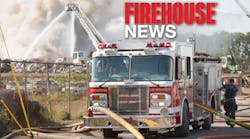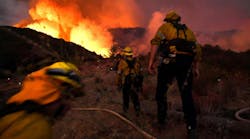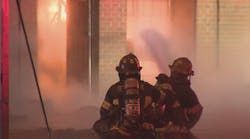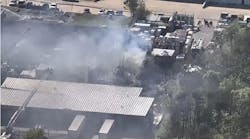I have a sad tale to tell. It speaks to a once great place that has fallen upon hard times. Of course this is not just one place. It is a composite of any number of places. It is up to you to fill in the blanks. For you see, I know the city about which I am writing: I know it quite well. In order to provide the fullest impact, I have decided to tell this tale in the form of a pseudo-fairy tale. It is my hope that you appreciate the thoughts contained herein, because I am writing this one from the center of my heart.
Once upon a time there once was a pretty little city. It was a tremendous place to live. The factories were humming, jobs were plentiful, and the population was growing. This lovely place boasted of its fine schools, terrific parks, a low crime rate, an effective police department, and a really great fire department.
Generations of people were born, grew to adulthood, and lived their entire lives within the borders of this fair metropolis. It was a diverse community before such things were in vogue within society. Religion served as part of the societal glue which held neighborhoods together. Houses of worship grew up in every part of the city. The downtown business district served the needs of the community and the industrial district provided jobs for succeeding waves of immigrants from other places.
Then the storm clouds of change began to appear on the horizon. Jobs were exported to other countries. People turned against each other and fought in the streets. Entire neighborhoods were vacated as masses of scared people fled to the suburbs. Over time the city deteriorated, the schools stopped delivering a top-quality education and many neighborhoods degenerated into armed camps.
Then there came a day when the money needed to provide fire protection and other vital municipal services were no longer available. Massive amounts of state aid flowed into the city schools, but there was not real, measurable effect upon the education of the students. Hundreds of police were laid off and scores more retired. No firefighters were laid off thanks to the retirements of more than 100 of the department's most experiences officers and members.
All of this has set the stage for a whole new world in the area of municipal services. As we move briskly into a new year, let me start by issuing a warning about what is going on around us. People are making some serious decisions about the fire service. Sadly these are people who do not have a clue as to what we do and have absolutely no business doing so. I am talking about Mayors, township committee people, town council members, and some really seriously mentally and morally challenged administrators.
But Harry, you might ask, how can you say such a thing about the people who are charged with running local government in a wide variety of places. Are they not supposed to provide the best possible municipal services and then cut property taxes. My friends, I can and will say all of this because it is becoming evident that we in the fire service are being deemed unimportant in the grand scheme of things.
Budget cuts are running all across the board in the United States today. If the income and the outgo are not equal, then adjustments must be made. Now I am not saying that cuts shouldn't be made. Lest you think that I am not affected by this, let me suggest that I am involved. I am playing my part in this whole budget-cutting morass. Heck, my fire department and National Guard pensions have been frozen by the powers-that-be at both the New Jersey and federal levels for the past two years.
However, I do not mind playing my part if others do too. Unfortunately, what I am becoming increasingly mad about involves the falsehoods being perpetrated by government people who simply cannot own up to the truth with their taxpayers. I am tired of people urging us all to do more with less.
I am also tired of the people who stole my pension money telling me that it is my fault that our system is underfunded. Bull! For nearly 30 years, I paid my tab. My buddies and I paid our tab. But the politicians decided that they were too smart. They decided to not only stop paying their share of my pension, but they "borrowed" billions from my buddies and I with no intention of paying anything back to us. Now in the Year of Our Lord 2011, it is my fault that we are short a few bucks.
Let us all face the hard facts of life my friends. You cannot do more with less. I have been the fire business long enough to know one solid fact for sure. The only thing you can do with a lesser level of resources is to provide a lower level of service. It is really that simple. If you cut a fire department from one level down to another, be warned: you will get less in the way of service.
Let me now share a story with you. It is my guess that if I were telling this tale in olden times, it would be presented in the form of a parable. A parable is defined as a succinct story, in prose or verse that illustrates a lesson. It differs from a fable, in that fables use animals, plants, inanimate objects, and forces of nature as characters, while parables generally feature human characters. Even though some of the people about whom I shall be speaking might be considered jackasses, they are still of the human rather than the animal variety.
They key to the delivery of a successful parable is to define and present a proper way for someone to act in a particular situation or circumstance. One need only pause to ponder the Parable of the Prodigal Son to see how a lesson about how a loving father should treat their sons when they go astray is properly presented within the context of a story.
In this particular parable we learn the lesson of how people who tell us they are there to support us really have no intention of doing anything positive for us. I would like to label this the Parable of the Lying SOB."
There is a powerful force running amuck in our country. People within governments from coast to coast are doing things under the guise of economic distress. We hear new stories every day about how the economic downturn has lead to a decrease in revenue across the board in America. I am concerned that people are not telling us the real story. When was the last time that you saw a slight up-tick in the economy with it being accompanied by an equal (or far worse) down turn somewhere. I think that one of the main reasons we are not coming out of this recession is that the news media are concerned that they would have nothing to report if we did.
However, this has led to an aura of fear among our government officials. The raising of taxes is not considered to be an option for our government officials. These folks operate under the mantra of "doing more with less." Let me remind you all that in the career part of the fire world there is only so much overhead which can be cut. Heck, salaries make up well over 90 percent of their agency's budgets.
So when you hear some erstwhile administrator urge their fire chief to take a five, ten, or twenty percent budget cut, what then is there to do but cut people from the ranks of government employment rolls? More than that, how much budget is there to cut in many volunteer fire departments? Not a lot if my research has any validity at all.
Let me suggest that I would love to be able to share this story with you in iambic pentameter, or some similarly pleasing lyrical verse, but that talent lies just beyond the veil of my ability. Good thing too for that verse might run along the lines of the old limerick which spoke of a "young man from Nantucket" or something like that. However, it is not my lot in life to be a poet, so I am just going to tell it to you like I see it.
Far too many cities, towns, townships, and villages are cutting their fire departments to a level that will not provide any sort of sufficient protection to their citizens. You cannot tell me that the laying off of 144 people and the closing of a number of fire stations will allow the citizens of Cincinnati to remain comfortable in their homes. You cannot tell me that the laying off of one-third of the Camden, New Jersey Fire Department will come without a serious impact upon their ability to protect the citizens of that poor, riverside city. Heck things are so bad in Camden that the Police Chief put out a press release that said if you have an incident of vandalism or a fender-bender without injuries, do not bother calling the police. If there are injuries, give us a call and we will do what we can.
Further, you cannot tell me that the closing of three more companies in the City of Newark, New Jersey will be without hazard. I reviewed the list of companies which are being closed and find scant comfort based upon the fact that there will still be an aerial ladder in service in one of the stations. I was chief of that Battalion for a number of years and frankly, there is no engine company close enough to that area of the city to provide adequate protection.
But Harry, you might ask, you have been retired for quite some time now. How can you possibly make such a statement? That is easy my friends. The traffic in that area was always a hindrance to the free movement of fire apparatus in those neighborhoods. I cannot imagine that there are less people in that section of the city or that the streets are any wider than they were when I roved throughout that part of the city to visit my troops and to respond to a wide range of emergencies.
I know the new fire chief to be a good man. In addition, I cannot fault the newly-appointed Fire Director or him in assessing the need to close companies to make up for the retirements which have been happening at high levels thanks to Governor Christie's assaults on our union contracts and our pension system. A great many friends of mine have taken their leave from the NFD in order to protect 25-35 years of accrued benefits. Heck, my own brother retired on October 1.
However, I cannot believe the contention of the city hall spokesperson who stated to the press that that closing the companies will come without negative issues. The only option to having less in the way of resources is to provide a lesser level of service. This is not magic. There are no silver bullets to kill the budgetary vampires which are sucking the life blood out of our agencies.
Over the course of the last forty years, the fire department in Newark has seen the loss of several hundred firefighting positions. A city which once had 25 engine companies, 12 truck companies, a fully-staffed fireboat, and a heavy rescue company is now a heck of a lot smaller. There are now 15 engine companies, 8 truck companies, and the heavy rescue company. The fireboat is cross-manned by a company more than ten minutes from where the boat is located. While the population of the city is now lower, the land mass and hazards protected by the city remain fairly consistent. I am suggesting that Newark is still a ten-gallon kind of a city, with all of the attendant big-city problems and challenges. How then can this major city continue to be protected by a fire department that is slipping toward the status of half-pint fire department?
It is my contention that the continuing cuts made as a result of the fiscal cuts to the city's funding stream are now reaching critical proportions. When you add to this valuable experience which has been driven out of the city fire department by state-imposed changes to the firefighter's benefits package and state imposed changes to the police and fire pension system, you begin to get a picture of a smaller and less experienced fire department being asked to do more with less.
Sorry gang. This just does not compute. As I stated earlier, less is all that you can do with less. What I am calling for is a change in the long-established policies which state that we in the fire service must be expected to be all things to all people. If you can only staff one engine, be sure the public understands what the one engine can do and what it cannot.
Let me suggest that the same is true in Cincinnati, Camden, and a whole host of cities, towns, townships, and villages all across the United States. There are places I am aware of where a force of two fire engines and two firefighters show up for a call and they are called adequate fire protection by the powers that be in those ill-formed places.
While I realize that government cannot grow money on a tree behind the town hall, what these governments can do is come clean for their citizens. Let me suggest that a bit of candor is in order. Please stop telling us all that it is raining when all the while you are spraying a certain bodily fluid onto our trousers.
Let me also suggest that even the most well-intentioned mutual aid agreements can only provide a certain level of resources for the region they cover. I have long heard the argument that the public does not care what color the fire truck is that responds to their emergency, just as long as one comes. That is true to a certain extent, but I would suggest that there are limits.
When you run through all of the trucks of all of the colors, and then there is nothing left because of budget cuts, what do you do? Let me suggest that we in the fire service need to embrace the lowering of municipal boundaries in search of the best fire protection system, regardless of station location. We need to help each other, but what we must avoid is the act of laying our burden on the shoulders of our mutual aid partners. They have budget problems too.
If we are going to share our resources, the load must be evenly distributed. I caution you to remember that mutual aid is a street which runs two ways. The come to you and you go to them. It has to be that way if the system is to have any chance at success. The main thing to remember in all of our fire protection planning is really quite simple. X number of people and X number of fire trucks can only provide whatever it is that X + X really is. There is no such thing as doing more with less. What I want all of you to do is be honest with the people you protect.
If you cannot provide an adequate service, based upon the appropriate standards and professional practices, man up and tell the truth. Provide an honest assessment of what you believe you can provide for the citizens of your community and tell them the truth. Wow, what a tremendous concept in government, the telling of the truth. Like the old TV commercial was so fond of saying, "…Try it, you'll like it." Good luck my friends.






